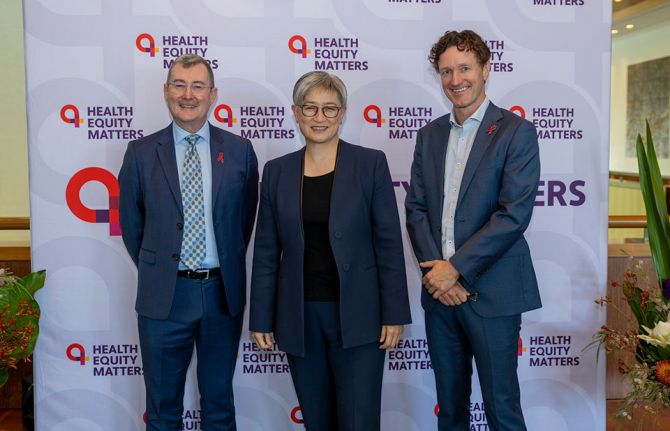

Press Statement
Australian Government enters new partnership with UNAIDS to let communities lead in ending AIDS in Asia Pacific
05 December 2023 05 December 2023As part of its ongoing support for ending AIDS in Southeast Asia and the Pacific, the Australian Government is investing up to AU$12 million in a new partnership supported by UNAIDS and Health Equity Matters. The funding will help local communities and governments in the region improve HIV prevention, testing and treatment while reducing stigma and discrimination.
"UNAIDS values Australia's long-standing partnership globally and in the Asia-Pacific region, and particularly its commitment to community leadership,” said Eamonn Murphy, UNAIDS Regional Director, Asia Pacific and Eastern Europe and Central Asia. "By both increasing service access and lowering HIV-related stigma and discrimination, we can accelerate progress toward ending AIDS as a public health threat."
In her announcement of this partnership, marking World AIDS Day, Australian Minister for Foreign Affairs, Senator the Hon Penny Wong said, "Globally we have made remarkable progress in the fight against HIV, but there is still more to be done. It is critical that Australia supports communities in our region to end the HIV epidemic, including through sharing our own knowledge and experience."
Australia’s own national testing, treatment and viral suppression results are on track to reach the 95-95-95 targets by 2025. As of the end of 2021, 91% of people living with HIV were diagnosed, 92% of those diagnosed were on treatment and 98% of those on treatment were virally suppressed. “Among the factors contributing to Australia’s prevention, testing and treatment success is its historical bipartisan commitment to partnering with civil society in the HIV response,” Mr Murphy said. “It is this approach that we need to expand throughout the region.”
HIV infections in the region are not yet falling fast enough to meet vital targets, and there are rising epidemics in a number of countries including Papua New Guinea, Fiji and the Philippines. Stigma and discrimination are contributing to the rise in new HIV infections, obstructing access to HIV prevention, testing and treatment services for men who have sex with men. Community- and key population-led service delivery is a critical tool for reaching people, especially young people, not yet accessing services.
"The most effective way to treat and prevent HIV is to empower the people who most feel its impact,” stressed Health Equity Matters CEO, Adjunct Professor Darryl O'Donnell.
The initiative, currently still under development, reflects a new model of partnership with community organizations which UNAIDS highlighted in this year’s World AIDS Day report as critical to ending AIDS.
UNAIDS
The Joint United Nations Programme on HIV/AIDS (UNAIDS) leads and inspires the world to achieve its shared vision of zero new HIV infections, zero discrimination and zero AIDS-related deaths. UNAIDS unites the efforts of 11 UN organizations—UNHCR, UNICEF, WFP, UNDP, UNFPA, UNODC, UN Women, ILO, UNESCO, WHO and the World Bank—and works closely with global and national partners towards ending the AIDS epidemic by 2030 as part of the Sustainable Development Goals. Learn more at unaids.org and connect with us on Facebook, Twitter, Instagram and YouTube.
